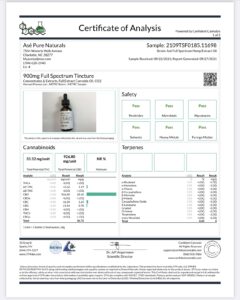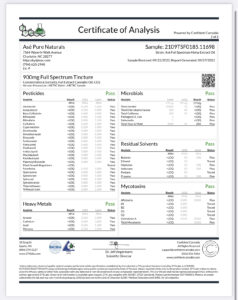Over the last several years, the CBD market has really exploded. From simple oil tinctures to tantalizing edibles, the options for CBD-infused products are seemingly endless. For the most part, this is good news for the consumer; having such a wide range of choices makes it easy to experiment different CBD delivery vehicles, and to identify the CBD product best suited to your health and wellness needs.
If there’s any downside, it’s simply this: With the explosion of CBD, a few bad actors and subpar products have crept into the marketplace. And while a majority of CBD companies are reputable and committed to natural and holistic health remedies, consumers must nevertheless be vigilant.
To help with your vigilance, reputable CBD companies have begun offering certificates of analysis, or COAs. Ideally, these documents help to distinguish trustworthy CBD products from the subpar stuff.
But what does a COA really mean? And what does it mean for you as you browse CBD products?
What is a Certificate of Analysis?
We often talk about the importance of buying CBD products that have been vetted by an independent laboratory. Well, a COA is the proof of that vetting process. Specifically, a COA provides the details of chemical analysis for the substance in question (for our purposes, that means CBD).
Generally speaking, an independent lab will test CBD products in batches, and each batch yields its own COA. It’s worth noting that some CBD companies perform their own testing and produce their own COAs. As you can probably imagine, a lot of consumers look askance at these in-house analyses. For the best, most impartial results, we recommend seeking CBD products that have been analyzed by third-party labs. Certainly, there are a number of unbiased, fully accredited labs that can provide CBD manufacturers with thorough testing.
So, let’s say you’re shopping for CBD products and wish to view the COA. How do you do so? Sometimes you can find all the information you need on the manufacturer’s website. Also note that, in some cases, CBD products come with QR codes on the packaging. By scanning them, you can immediately pull up a full COA for the product in question. A number of states actually require CBD manufacturers to provide these QR codes. You’ll want to check your local regulations to see if this is the case where you live.


What Does the COA Tell You?
Of course, actually obtaining a COA is just the beginning. You’ll also need to know how to read it. There are a few pieces of information that you’ll find on the COA:
- Types of cannabinoids. When you’re viewing the chemical analysis of a hemp-based product, you should expect to see a list of the various cannabinoids included. For full-spectrum products, this will usually encompass a variety of cannabinoids, some such as CBD, CBGA, CBN and CBG. This is also the part of the COA where you can expect details about the product’s THC content.
- Concentration. In addition to listing different types of cannabinoids, the COA will also provide you with the concentration of each cannabinoid, relative to the other ingredients in the product. This section of the COA is useful as you look to make sure you’re getting what you paid for (e.g., CBD oils that really do contain a decent concentration of CBD).
- Heavy metals. Chemical analyses will usually include information about heavy metal content, which helps you ensure that the product you’re taking is safe and free of potential toxins.
- Pesticides. Along the same lines, the COA will let you know if you’re about to buy a CBD product that contains commonly used pesticides.
COA Red Flags and Warning Signs
Ultimately, a quick glance at the COA can tell you quite a bit about the integrity of a CBD product. Specifically, we recommend avoiding products that include any of these warning signs or red flags:
- Too much THC
- Too few cannabinoids, especially in “full spectrum” products
- The presence of heavy metals or pesticides
- Analyses completed in-house rather than by a third party
Questions? Ready to learn more about the lab testing process we employ here at Asé Pure Naturals? We’d love to help you make an informed decision about your next CBD purchase. Contact us to learn more about our safe, natural, holistic, and scrupulously tested products today.








